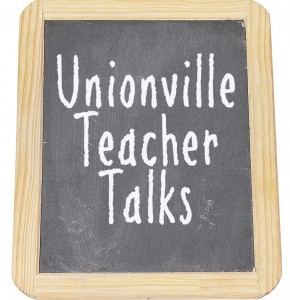Health care plan, changes in seniority rules remain major stumbling blocks
By Mike McGann, Editor, UnionvilleTimes.com
 POCOPSON — Talks continue between the Unionville-Chadds Ford School District and its teachers union, but whether progress in those talks is being made depends on who is doing the talking.
POCOPSON — Talks continue between the Unionville-Chadds Ford School District and its teachers union, but whether progress in those talks is being made depends on who is doing the talking.
“The discussions are hard, but progress is being made,” said board Vice President Frank Murphy, a member of the district’s negotiating team, during Monday night’s Board of Education meeting. Murphy said that both sides had exchanged ideas and numbers, with some movement on both side’s positions.
Teacher union sources painted a less rosy picture of the talks, though, suggesting that the health-care benefit issue remains a major a stumbling block, as well as proposals to change the salary step structure, slowing teachers’ seniority raises.
The district is attempting to get the teachers to accept changes to their health care plan similar to what the district’s administrators agreed to last year. The district is in ongoing talks to get its support personnel to agree to the same plan and while those talks are continuing, no deal has been completed.
Board member Jeff Hellrung defended the district’s attempts to cut expenses on its self-insured health care plan, noting that the the rapid increases in cost to the district were probably the biggest long-term worry — outstripping those of looming spikes in pension costs. He noted that administrators had accepted modest salary increases and more of the cost of their health plan, which remains a Preferrer Provider Organization or PPO style plan, as opposed to switching to a less costly Health Maintenance Organization or HMO.
Union sources counter that the district has not been entirely forthcoming in terms of revealing how — and if — all the money employees pay into the health care fund, as well as those paid by the district under the continuing terms of the expired deal, are being accounted for and whether there are surpluses in the fund.
A strike by the teachers remains unlikely, at least during the 2010-11 school year, in part because weather closures would limit a strike to 10 days, instead of the maximum of 15 allowed by state law, as the school year must end by June 30 and any strike days would have to be added to the end of the current school calendar, now slated to end on June 16.
However, both sides are under some pressure to get a deal done sooner rather than later.
The district would like to get the health care issue resolved before July 1, when it would have to reenroll teachers for the health care plan for the next school year, meaning any potential savings won through negotiation after that would be pushed back to the 2012-13 budget year.
The teachers, meanwhile, have gone almost a year without a contract and continue to work under the terms of the old deal, with no salary increases. Since it is extremely unlikely a new contract would include retroactive salary increases, the longer the talks drag out, the longer the period of any negotiated salary hike would end up being spread. For example, assuming that the teachers get a 2.5% hike per year over the term of a theoretical three-year deal, that hike when applied to the 2010-11 school year with no raise would leave the teachers with effective salary increases not much beyond the district’s original 1.8% over four year increase offer.
Throwing a bit of a monkey wrench into that calculation is Gov. Tom Corbett’s call for public employees to accept a one-year wage freeze. The president of the Pennsylvania State Education Association, Jim Testerman, said last week that he was encouraging all local teachers unions to discuss accepting such a wage freeze in effort to preserve programs and class sizes. Local union sources suggest they would be amenable to such discussions, as the teachers say they have essentially been under a wage freeze already for the 2010-11 school year.







Who no quotes from union officials? Using “union sources” gives this story less credibility. Very shallow.
I dunno, “Joe.” Posting an anonymous attack from a Journal-Register (parent company of the The Daily Local News and The Kennett Paper) IP address seems just a bit more “shallow” if you ask me.
As for the use of unnamed sources, well, I think there’s merit to getting information on background or not for attribution. And when multiple sources confirm the information, I think it’s fair game for reporting. But I certainly welcome comment on the issue.
Why is there so much more information in this story than in the Daily Local today?
For a detailed picture of what UCFSD teachers actually earn see this you tube video…
http://www.youtube.com/watch?v=2fGw_3F7Q8c